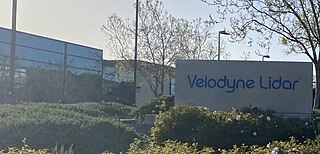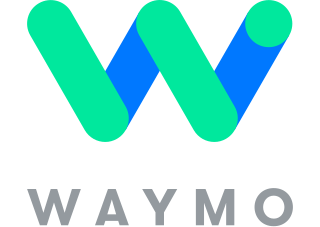
A self-driving car, also known as an autonomous car (AC), driverless car, or robotic car (robo-car), is a car that is capable of driving without human input. Self-driving cars are responsible all driving activities including perceiving the environment, monitoring important systems, and controlling the vehicle, including navigating from origin to destination.

Vehicular automation involves the use of mechatronics, artificial intelligence, and multi-agent systems to assist the operator of a vehicle such as a car, lorries, aircraft, or watercraft. A vehicle using automation for tasks such as navigation to ease but not replace human control, qualify as semi-autonomous, whereas a fully self-operated vehicle is termed autonomous.

Velodyne Lidar is a Silicon Valley-based lidar technology company, headquartered in San Jose, California. It was spun off from Velodyne Acoustics in 2016. As of July 2020, the company has had about 300 customers. Velodyne Lidar ships sensors to mobility industry customers for testing and commercial use in autonomous vehicles, advanced driver assistance systems, mapping, robotics, infrastructure and smart city applications. In February 2023, the company merged with Ouster.

Waymo LLC, formerly known as the Google Self-Driving Car Project, is an American autonomous driving technology company headquartered in Mountain View, California. It is a subsidiary of Alphabet Inc, the parent company of Google.

Experiments have been conducted on self-driving cars since 1939; promising trials took place in the 1950s and work has proceeded since then. The first self-sufficient and truly autonomous cars appeared in the 1980s, with Carnegie Mellon University's Navlab and ALV projects in 1984 and Mercedes-Benz and Bundeswehr University Munich's Eureka Prometheus Project in 1987. Since then, numerous major companies and research organizations have developed working autonomous vehicles including Mercedes-Benz, General Motors, Continental Automotive Systems, Autoliv Inc., Bosch, Nissan, Toyota, Audi, Volvo, Vislab from University of Parma, Oxford University and Google. In July 2013, Vislab demonstrated BRAiVE, a vehicle that moved autonomously on a mixed traffic route open to public traffic.
The LUTZ Pathfinder is a prototype autonomous microcar. The two-seater prototype pod has been built by Coventry-based RDM Group, and was first shown to the public in February 2015.
A robotaxi, also known as robo-taxi, self-driving taxi or driverless taxi, is an autonomous car operated for a ridesharing company.

Starship Technologies is an Estonian company developing autonomous delivery vehicles. The company is headquartered in San Francisco, California, with engineering operations in Tallinn, Estonia, and Helsinki, Finland. Starship also has offices in London, UK, Germany, Washington, DC, US, and Mountain View, California, US.
Roborace was a competition with autonomously driving, electrically powered vehicles. Founded in 2015 by Denis Sverdlov, it aimed to be the first global championship for autonomous cars. From 2017 to 2019, the official CEO was 2016–17 Formula E champion, Lucas Di Grassi, who later became a member of Roborace’s supervisory board. The series tested their technology and race formats at FIA Formula E Championship events during 2016–2018. In 2019 Roborace organized Season Alpha, which consisted of 4 trial racing events with several independent teams competing against each other for the first time. In 2020–21 Roborace held Season Beta with 7 competing teams. All teams utilized the same chassis and powertrain, but they had to develop their own real-time computing algorithms and artificial intelligence technologies.
Autonomous racing, self-driving racing or autonomous motorsports is an evolving sport of racing ground-based wheeled vehicles, controlled by computer. A number of events and series have launched, including the international Formula E spin-off series Roborace. and Self Racing Cars as well as student competitions such as Formula Student Driverless.

Argo AI was an autonomous driving technology company headquartered in Pittsburgh, Pennsylvania. The company was co-founded in 2016 by Bryan Salesky and Peter Rander, veterans of the Google and Uber automated driving programs. Argo AI was an independent company that built software, hardware, maps, and cloud-support infrastructure to power self-driving vehicles. Argo was mostly backed by Ford Motor Co. (2017) and the Volkswagen Group (2020).

Oxa is an autonomous vehicle software company, headquartered in Oxfordshire, England, and founded by Paul Newman and Ingmar Posner.

Pasi William Sachiti is a Zimbabwean-born British entrepreneur and inventor. Sachiti is the founder and CEO of Academy of Robotics, an autonomous technology company which is primarily known for developing street-legal self-driving vehicles and solutions for road maintenance.

A self-driving truck, also known as an autonomous truck or robo-truck, is an application of self-driving technology aiming to create trucks that can operate without human input. Alongside light, medium, and heavy-duty trucks, many companies are developing self-driving technology in semi trucks to automate highway driving in the delivery process.
Navya is a French company specialized in the design and construction of autonomous and electric vehicles.
Nuro, Inc. is an American robotics company based in Mountain View, California. Founded by Jiajun Zhu and Dave Ferguson, Nuro develops autonomous delivery vehicles and is the first company to receive an autonomous exemption from the National Highway Traffic Safety Administration.
Drive.ai, a subsidiary of Apple Inc., is an American technology company headquartered in Mountain View, California that uses artificial intelligence to make self-driving systems for cars. It has demonstrated a vehicle driving autonomously with a safety driver only in the passenger seat. To date, the company has raised approximately $77 million in funding. Drive.ai's technology can be modified to turn a vehicle autonomous.

Yandex self-driving car is an autonomous car project of the Russian-based technology company Yandex. The first driverless prototype launched in May 2017. As of 2018, functional service was launched in Russia with prototypes also being tested in Israel and the United States. In 2019, Yandex revealed autonomous delivery robots based on the same technology stack as the company's self-driving cars. Since 2020, autonomous robots have been delivering food, groceries and parcels in Russia and the United States. In 2020, the self-driving project was spun-off into a standalone company under the name of Yandex Self-Driving Group.
Pony.ai is an American autonomous vehicle technology company co-located in Silicon Valley, Beijing, and Guangzhou.
Academy of Robotics is a UK-based artificial intelligence technology company that creates technology to automate repetitive tasks and logistics.

















